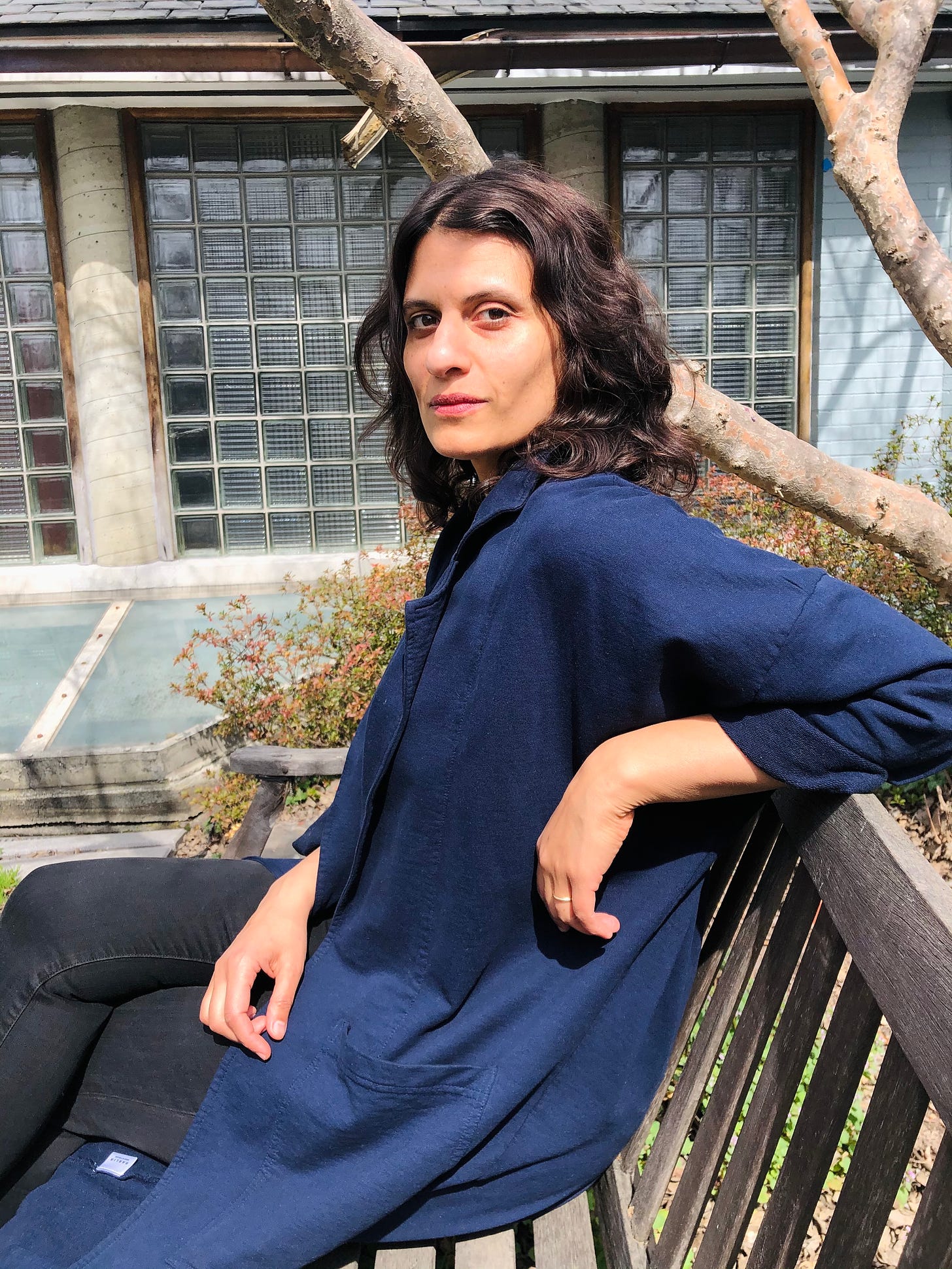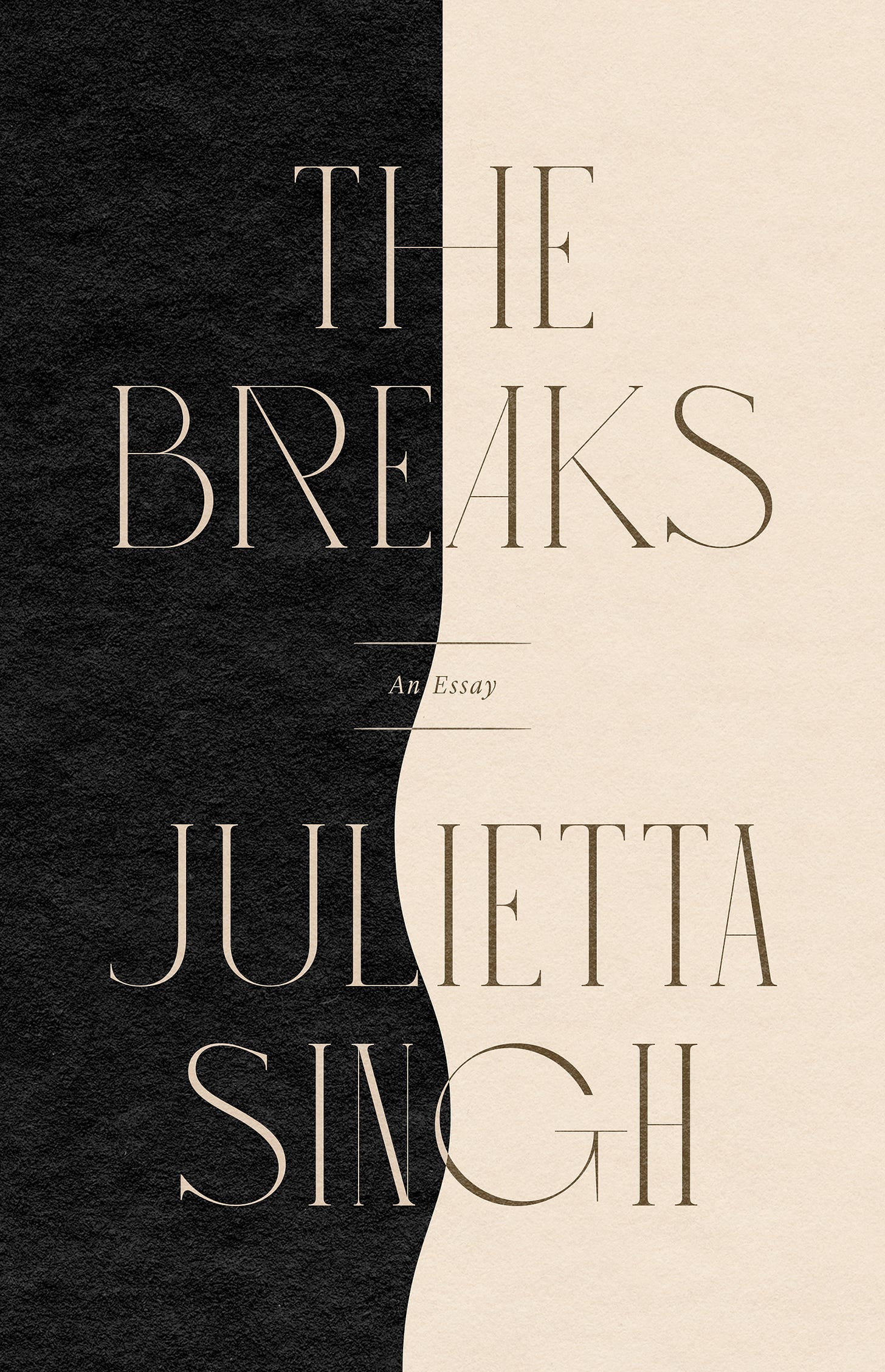Unlearning while parenting
5 questions for writer, professor, and paradigm-shifting parent Julietta Singh
When I was a first-year in high school, we got to pick a novel from a list and do an independent read and report on it. Knowing nothing of absurdism or existentialism, I read The Stranger by Camus. I have no idea why I picked it. I had no frickin’ clue what was going on. Wrong book. Wrong time.
Reading Julietta Singh’s The Breaks was the opposite experience: exact right book, exact right time for me. As Learning in Public was making it out into the world, and I was dealing with all the feelings of being so visible as a mother and an ethical seeker, I heard about Singh’s new book-length essay. Reading her words was like being in a long conversation with a brilliant friend—someone both in love with her child and fiercely attached to giving her the ugly truth, someone radical and sober as hell, someone still creative and hopeful in the midst of it all. I couldn’t wait to be in actual dialogue with her…
Courtney Martin: I’m so curious about the origins of this book. When did you start it, and when did you realize it was, in fact, a book-length essay?
Julietta Singh: I started it a few years ago, just as I was getting set to release my last book, No Archive Will Restore You. I had been plotting to write it for years, turning it around in my mind as I watched my daughter grow, but felt an urgent pull toward the writing in the aftermath of the 2016 election and all that was under threat during that time.
Among other things, the book is a reckoning with the place of brownness and racial hybridity in a nation so locked into a Black/white binary discourse of race. I wrote it as a letter to my daughter, and that could well have been the limit of its life. I suppose I knew all along that it was a book-length essay, though I didn’t expect it to find a publishing home or a wide readership given its stance on the limits of current race discourses and on the potentials of a different kind of childhood education that doesn’t aim to produce complacent citizens or rehearse top-down narratives of our national past.
It’s is addressed to your daughter throughout--using the “you” voice. How and why did you make that choice?
I love the second-person address! Margaret Atwood has an incredible line in The Handmaid’s Tale where she writes: “You can mean more than one. You can mean thousands.” I love how “you” is both an intimate address and a rallying cry to the masses.
There is a singular you in this book who is my daughter, but there is also a you that is a gathering of bodies, a summoning of an “us” that is emerging, not yet fully known but no less eager to change the course of history.
Both the singular and plural you are, to my mind, potentially revolutionary figures.
I thought you did such a gorgeous job of acknowledging the depths of our problems (pandemic, economic, environmental) and the need for a certain kind of sober surrender, while still making me feel like I had agency in the choices I am making about how I parent and live. Can you talk about that blending of surrender and agency?
Thanks so much for this beautiful formulation, Courtney. I owe my mum props for this orientation, since I was parented through that incredible mix of blunt reality and social responsibility. It’s vital to me to address the world as it is, rather than to indulge in fantasies that deny the unpalatable realities of the past and the present. I don’t know that I’d call this acknowledgement an act of surrender, but it is certainly a blunt confrontation with the fact that we live on a planet in peril, and that systemic racism, planetary destruction, and patriarchy are interwoven and codependent forces. I don’t want to turn us away from these facts; I want to understand them better and to live and parent against them.
There’s a moment in the book where I write about that part of me that has wanted to give up on our species, but family-making in all its styles and forms, and however unconventional, is an act that in its very undertaking summons us to refuse that impulse.
You write beautifully about your non-traditional family--both in terms of the labor and love, but also the physical space and how it is set-up. I also live in a non-traditional setting -- a cohousing community. It made me wonder if there is something about taking that first step--to live differently in space itself, that allows mothers like us to think differently about parenting on the page. Thoughts?
I want to visit your cohousing community! I wonder whether living differently in space is not so much a first step as it is a step that is palpably different for us and to others. What I mean is that in order to get there, you’ve already taken myriad other steps to orient yourself differently, to get to that place where the recognizably different step can be taken.
As you know well, environment and writing are intimately bound, and writing can’t help but to be in a concert with its surroundings. My best friend and co-parent, Nathan Snaza, has taught me (through queerly cohabitating with him and through his fantastic book Animate Literacies) that our engagements with the world around us as we undertake the acts of writing and reading involve an amazing network of relations that far exceed our conscious awareness.
It’s similar with parenting, an act in which we’re always working consciously and unconsciously, and always influenced by the social, environmental, and political worlds around us, whether or not we recognize that fact. As writers writing about race and mothering, one of the things that you and I share is an attunement that enables us to write with those networks and relations in mind.
You write: “Can’t parenting be reconceived as life’s most enduring act of radical pedagogy? Maybe it’s too simple to refuse it outright...Why not engage it as an intimate, unrelenting experiment in unlearning the world we've inherited?” What are you unlearning these days?
What a brilliant question. In these enduring pandemic times, I’ve been unlearning my attachments to certain structures and routines (having solitude, for instance!) that I used to take for granted and find necessary. Along with most everyone else, I’m busy inventing new habits and practices. And suddenly, as The Breaks begins to enter the world, I have an emerging “tween” on my hands! I’ve moved from early childhood parenting to another kind of engagement altogether; we’re knee deep into puberty talks, and I’m carefully unlearning my own profoundly unhealthy social inheritance as a gendered and racialized body as I try to guide her into a healthy relation with her own. It’s reparative and bolstering, these particular acts of unlearning.
We have donated to Girls for a Change, an amazing organization in Singh’s town of Richmond, “changing the trajectory of Black girls lives.”






So excited to read this book!
For those interested in Julietta Singh's book, there is an excerpt in the Paris Review.